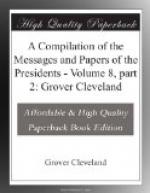The points on which it will be perceived that the two boards disagree in regard to relative rank between officers of the Army and Navy are not esteemed of very great practical importance, and the adoption of the rule proposed by either would be acceptable to the Executive.
But even if a decision on these shall be suspended, it is hoped that the bills which are designed to regulate rank, precedence, and command in the Army and Navy as separate branches of service may receive the sanction of Congress, with such amendments as may be deemed appropriate, in the course of the present session.
MILLARD FILLMORE.
WASHINGTON, February 3, 1851.
To the Senate of the United States:
I transmit to the Senate a report from the Secretary of State, with accompanying papers,[4] in answer to their resolution of the 30th ultimo.
MILLARD FILLMORE.
[Footnote 4: Correspondence relative to the possessory rights of the British Hudsons Bay Company in Oregon.]
WASHINGTON, February 12, 1851.
To the Senate of the United States:
I transmit herewith a report from the Secretary of State, with accompanying documents,[5] in answer to the Senate’s resolution of the 1st instant.
MILLARD FILLMORE.
[Footnote 5: Correspondence with Spain relative to the claim of the owners of the schooner Amistad for compensation on account of the liberation of negroes on board said vessel.]
WASHINGTON, February 13, 1851.
To the Senate of the United States:
I herewith communicate to the Senate, for its consideration, a general convention between the United States and the Swiss Confederation, concluded and signed at Berne on the 25th day of November last by Mr. A. Dudley Mann on the part of the United States and by Messrs. Druey and Frey-Herosee on the part of the Swiss Confederation. I communicate at the same time a copy of the instructions under which Mr. Mann acted and his dispatch of the 30th November last, explanatory of the articles of the convention.
In submitting this convention to the consideration of the Senate I feel it my duty to invite its special attention to the first and fifth articles. These articles appear to contain provisions quite objectionable, if, indeed, they can be considered as properly embraced in the treaty-making power.
The second clause of the first article is in these words:
In the United States of America citizens of Switzerland shall be received and treated in each State upon the same footing and upon the same conditions as citizens of the United States born in or belonging to other States of the Union.
It is well known that according to the Constitution of the United States a citizen of one State may hold lands in any other State; and States have, sometimes by general, sometimes by special, laws, removed the




